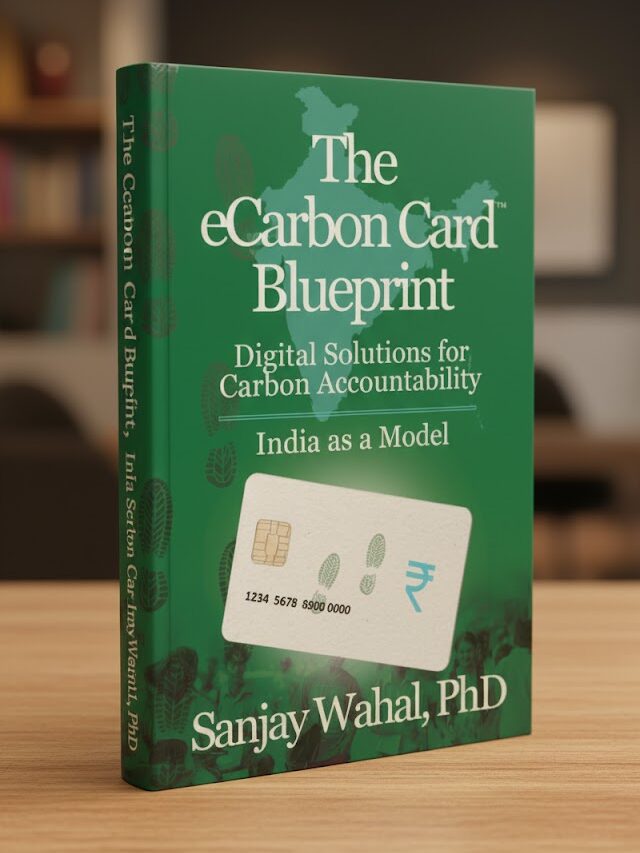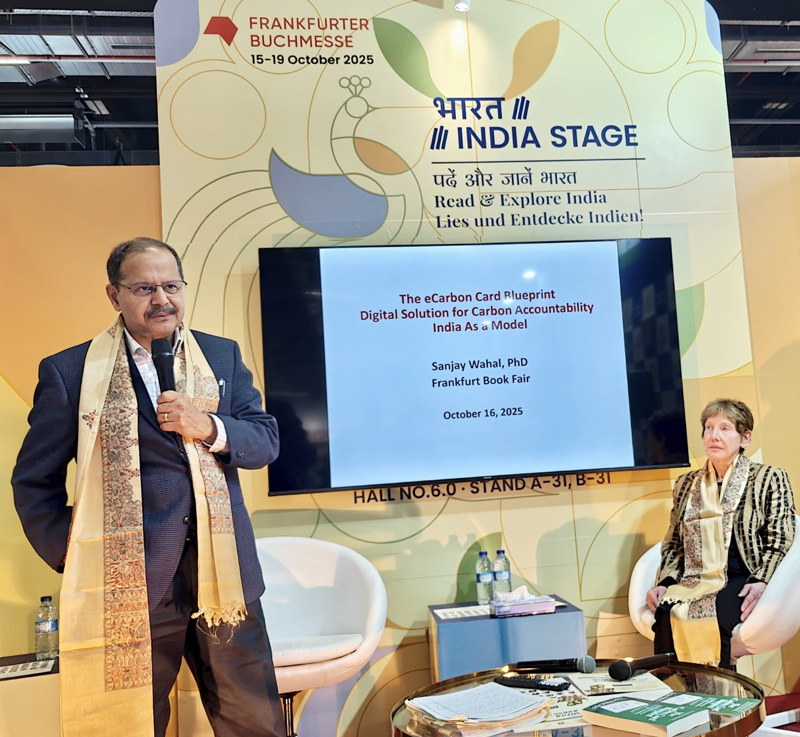
Pioneering Future Strategies in Leadership, Innovation & Technology.
Featuring My New Book: The Decarbon Blueprint.

The Decarbon Blueprint
A Strategic Guide for Sustainable Transformation.
Discover actionable insights and proven strategies to implement cutting-edge decarbonization solutions that accelerate your organization’s journey toward sustainability and resilience.
A must-read for business leaders, innovators, developers, policymakers, and changemakers committed to shaping a low-carbon future.
Empower your organization to drive both profitability and planetary well-being — transforming climate ambition into measurable action and long-term value.
Order Your Copy
Download Your Free PDF
Please fill in your details to access the PDF
Thank You!
Your PDF is opening now. If it doesn't open automatically, click the button below.
What Readers Are Saying About This Book:

During my tenure leading the Product Development Team at Buckeye Technologies, I had the opportunity to collaborate closely with Dr. Sanjay Wahal, who made significant contributions in developing and commercializing airlaid absorbent cores for personal hygiene applications. His technical depth and strategic insight into product development set him apart. In The eCarbon Card Blueprint, Sanjay extends this systems thinking approach to the urgent challenge of decarbonization and climate action-creating a technically sound and visionary framework that connects digital infrastructure with citizen behaviour and market mechanisms. This book bridges innovation and real-world impact, offering a model that could transform how individuals and systems engage with carbon responsibility.
Jeffrey S. Hurley, Ph.D.
Former General Manager, Automotive Business Group, Buckeye Technologies
(later Georgia-Pacific)
I had the privilege of working with Sanjay during his time as a Technology Innovation Leader at Celanese Corporation, and I have always admired his ability to combine deep technical expertise with strategic vision. In The eCarbon Card Blueprint, Sanjay applies the same innovative thinking and systems approach to one of the greatest challenges of our time-climate change. His framework for digital carbon accountability is both practical and forward-looking, offering a model that can drive meaningful action at both individual and national levels. This book is a must- read for anyone seeking bold, actionable solutions for a sustainable future.
Peter E. Holmes, Ph.D.
Former Senior Executive, Celanese Corporation
Having known Sanjay since our IIT Kanpur days, I have always admired his commitment to applying technical expertise to societal challenges. In The eCarbon Card Blueprint, Sanjay has developed a transformative concept that bridges technology, policy, and human behaviour to tackle climate change. The idea of integrating India's digital infrastructure with market-based carbon mechanisms is both visionary and practical—offering a model that could be replicated globally. It is a refreshing, actionable approach to democratizing climate action.
Manoj Mishra, Ph.D
Accelerating decarbonization demands inclusive action. This book by Sanjay Wahal compellingly argues for broader public participation and introduces the innovative eCarbon card system-a promising tool to empower individuals in tracking and reducing their carbon footprint. A timely and thought-provoking concept worth exploring to democratize climate responsibility and drive systemic change.
Mr. Sumant Sinha
Founder, Chairman & CEO of ReNew, India
I had the privilege of working with Sanjay during his time as a Technology Innovation Leader at Celanese Corporation, and I have always admired his ability to combine deep technical expertise with strategic vision. In The eCarbon Card Blueprint, Sanjay applies the same innovative thinking and systems approach to one of the greatest challenges of our time-climate change. His framework for digital carbon accountability is both practical and forward-looking, offering a model that can drive meaningful action at both individual and national levels. This book is a must- read for anyone seeking bold, actionable solutions for a sustainable future.
Ashish Garg, Ph.D.
Professor of Sustainable Energy Engineering, Kotak School of Sustainability & The Kesavan Center, Indian Institute of Technology, Kanpur, India
I have had the privilege of knowing Sanjay Wahal not only through professional interactions but also as family-Sanjay's daughter is married to my son. I have long admired his integrity, technical rigor, and his ability to translate complex innovation into scalable, social-impact solutions. In The eCarbon Card Blueprint, Dr. Wahal brings together India's advanced digital ecosystem, behavioural economics, and market-based mechanisms to offer a citizen-centric blueprint for decarbonization. This is a timely and practical model that bridges individual action and national strategy-ideal for nations seeking inclusive and technology-enabled pathways to climate responsibility.
Mr. Philippe Goetschel
Former executive at Microsoft, Lotus, Symantec. McKinsey & Company consultant and Honorary Consul of Switzerland
As someone deeply involved in advancing carbon utilization technologies, I find the eCarbon Card Blueprint to be a rare, timely and insightful contribution. Dr. Wahal's vision of combining digital identity systems with practical economic incentives and market-driven mechanisms for carbon accountability is both innovative and grounded in real-world applicability. It offers a scalable model that can align industrial operations, policy frameworks, and citizen engagement toward Net Zero. For anyone seeking practical, technology-driven carbon management, this book is an essential resource.
Umesh Jayaswal, Ph.D.
Industry Technology Expert in Carbon Utilization, Boston
The eCarbon Card Blueprint offers one of most compelling and viable frameworks for India's decarbonizaion journey. By leveraging the country's robust digital backbone- Aadhar, UPI, and scalable fintech platforms- Dr Wahal demonstrates how carbon accountability can be made practical, transparent, and citizen- centric. This concept is not just very innovative; it is actionable and highly relevant for India's ambition to lead the world in digital- driven climate solutions. Beyond India, this book can become a playbook for the countries worldwide striving to meet their net- zero goals while ensuring fairness and inclusivity.
Alok Tandon
Chairperson, Joint Electricity Regulatory Commission for Goa and Union Territories
For individuals, initially through voluntary, gamified participation—rewarding low-carbon choices. Over time, policy integration and AI-driven audits ensure accountability without coercion. For carbon intensive heavy industries – steel, cement, coal-based power stations, petrochemicals etc., it will be gradually made mandatory.
An independent, blockchain-based consortium (aligned with UNFCCC goals) under a multi-stakeholder board ensuring transparency, fairness, and data integrity. For example, Carbon Authority of India- CAI (as proposed in the book)
Users may earn carbon credits which are redeemable for discounts on green products, renewable energy, travel, or even tax rebates in partner economies.
AI safeguards flag anomalies, while positive incentives and community monitoring promote trust and accountability over punishment.
By spawning new roles in creating centralized carbon intensity database based on carbon calculation engine, installation of smart meters, sensors and other IoT devices to monitor and track live carbon emissions – all leading to carbon accounting, app development, ESG consulting, data analytics, and green certification—potentially generating over a million jobs globally.
A governance model where citizens use digital platforms to vote on carbon policies—making climate governance participatory and transparent.
They gain access to global carbon markets where carbon credits (surpluses) can be traded for Green Income or Economic Capital, green technology transfers, and climate financing—accelerating equitable development.
Through tokenized carbon credits on the eCarbon platform—allowing everyone to invest, trade, or offset emissions personally.
An AI-powered virtual model of your lifestyle that simulates the impact of choices and suggests carbon-optimized alternatives.
Only with consent. Data comes from opt-in integrations (like banking or utilities), encrypted and fully user-controlled.
You do. Data is stored on decentralized ledgers i.e. blockchains, anonymized for analytics, and always deletable—compliant with GDPR-style standards (General Data Protection Regulation as enacted by the European Union (EU) in 2018—these standards are widely considered the global benchmark for personal data protection).
A dynamic, AI-calculated allowance reflecting your geography, income, and energy access—ensuring fairness across social and regional lines.
Your eCarbon dashboard integrates all three—rewarding low-carbon meals, EV commutes, and renewable energy use in real time.
Through open-access dashboards, independent audits, and equitable policies that connect transparency, fairness, and climate justice. CAI will play a key role in this
Revolutionary Ideas on Innovation, Technology & Life
Welcome to my space—where innovation, technology, and life converge.
For over 30 years, I’ve been deeply engaged in advancing green science, biobased materials, biopolymers, sustainable technologies, low- and zero-carbon solutions, clean energy, advanced nonwovens, technical textiles, manufacturing platforms, and other disruptive innovations that transform industries and improve lives.
My journey through these ever-evolving domains has taught me that innovation isn’t just about invention—it’s about solving real-world problems in ways that create value, empower society, protect the planet, and foster lasting progress.
As a veteran of the science, technology, and innovation ecosystem, my mission is to address the world’s most pressing challenges through solutions that are both economically viable and rooted in human well-being.
Here, I share insights on the complexities of technological innovation, emerging trends in low-carbon solutions and sustainability, and strategies that drive meaningful business growth and transformation.
Drawing on decades of industry experience, technical expertise, and personal reflection, I offer both strategic and practical perspectives on how meaningful innovation shapes—and is shaped by—our daily lives.
These reflections explore the intersection of technology, human experience, and value creation—offering lessons in leadership, business growth, and navigating the complexities of emerging technologies.


Passion
I am deeply committed to addressing the global climate crisis, driven by a profound responsibility to safeguard our planet for future generations. In an era where the impacts of climate change are becoming increasingly visible—rising sea levels, extreme weather events, and biodiversity loss—the urgency for sustainable solutions has never been greater.
My mission is to actively contribute to this global effort by developing, supporting, and scaling innovations that go beyond emission reduction. I aim to transform industries, enable eco-conscious behaviors, and empower individuals and organizations to adopt sustainable practices. This passion is rooted in the belief that meaningful impact demands collaboration, creativity, and urgency. There is no time to wait—every solution matters, no matter how small.
Each one contributes to the broader movement toward a sustainable, equitable future.As a proponent of the circular economy and systemic sustainability, I champion the use of cutting-edge technologies—data science, materials innovation, artificial intelligence, machine learning, advanced robotics, synthetic biology, and quantum computing—to unlock bold, disruptive pathways for progress.
"Learn more" about this work Visit Decarbonization LLC.
Sanjay & Anupama Wahal Foundation
The Sanjay and Anupama Wahal Foundation was founded by me and my wife, Dr. Anupama Wahal—a compassionate leader and changemaker—to advance meaningful solutions to the global climate crisis. Our foundation is dedicated to enabling sustainable practices and technologies that protect the environment and improve quality of life for future generations.
Our mission is to support innovative approaches that foster environmental resilience, economic inclusion, and social equity. We work with emerging ventures, organizations, and changemakers to help scale their impact before it's too late. A key part of our work involves mentoring and guiding start-ups that are tackling sustainability and climate challenges.
Through hands-on support, strategic guidance, and access to global networks, the Foundation serves as a catalyst for early-stage innovation, helping founders unlock their full potential and contribute meaningfully to climate solutions.
Ways the Foundation Mentors Start-Ups
We provide tailored mentorship and resources designed to help sustainability-focused start-ups thrive:
- Strategic Guidance
- Technical Expertise & Innovation Support
- Network & Partnership Development
- Access to Resources
- Sustainability & Impact Measurement
- Business Development & Scaling
- Long-Term Vision & Leadership Coaching
- Workshops & Mentorship Programs